C++ 解析JSON 用什么库好呢?
去JSON官网看看有没有什么库推荐的
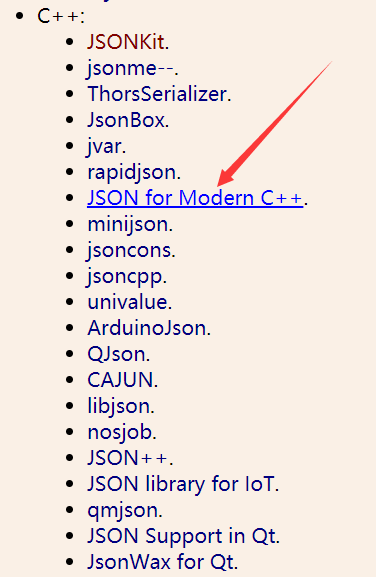
一眼瞅上去这个 JSON for modern C++ 看上去挺顺眼的
好,就它了!
点击去就是这个项目的GitHub
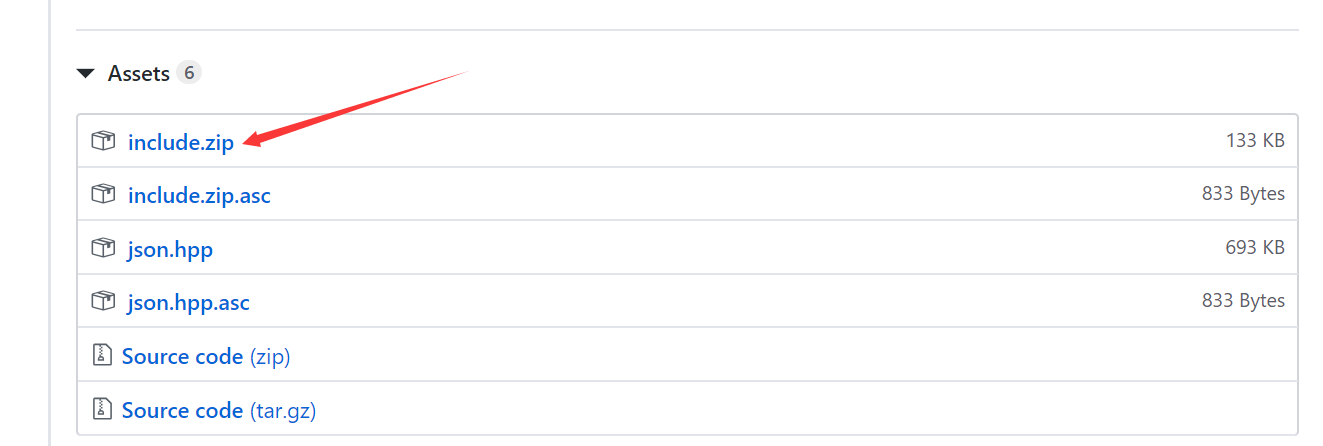
先去下载最新的 Release
把这个include 解压到你的编译器include目录下面
我这台Windows 上安装了 MinGW64
所以我将它解压到了这里
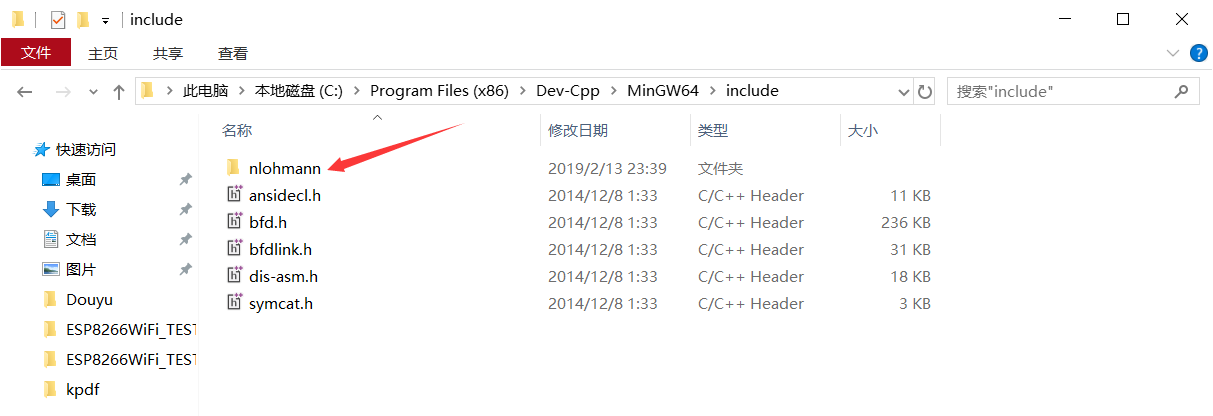
至此JSON解析库已经安装好了
那么该如何使用呢?
还是看看作者写的文档吧
https://github.com/nlohmann/json/tree/develop/doc/examples
这个作者真是给力,example 写了好多啊(德国大佬真能写)(滑稽)
随便挑一个例子试一试吧
test.cpp
#include <iostream>
#include <iomanip>
#include <nlohmann/json.hpp>
using json = nlohmann::json;
int main()
{
// create a JSON object
json j =
{
{"pi", 3.141},
{"happy", true},
{"name", "Niels"},
{"nothing", nullptr},
{
"answer", {
{"everything", 42}
}
},
{"list", {1, 0, 2}},
{
"object", {
{"currency", "USD"},
{"value", 42.99}
}
}
};
// add new values
j["new"]["key"]["value"] = {"another", "list"};
// count elements
auto s = j.size();
j["size"] = s;
// pretty print with indent of 4 spaces
std::cout << std::setw(4) << j << '\n';
}
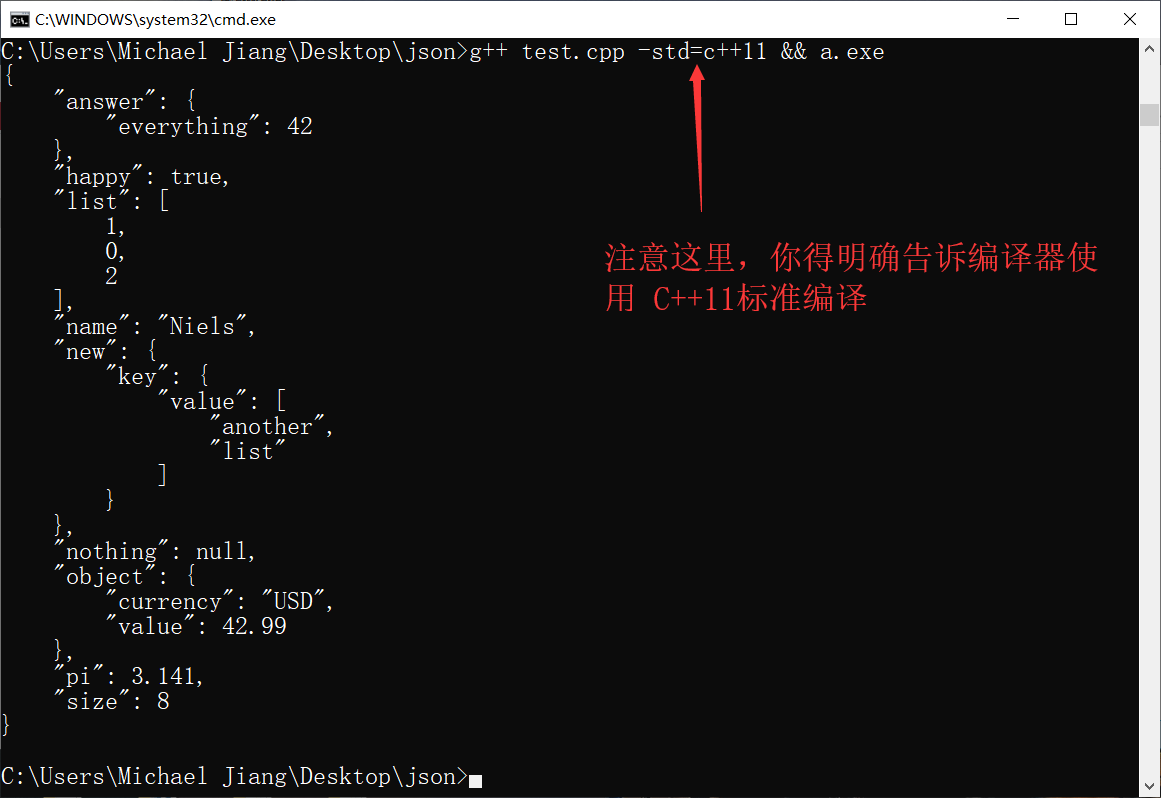
test2.cpp
#include <iostream>
#include <iomanip>
#include <nlohmann/json.hpp>
using json = nlohmann::json;
int main()
{
// create a JSON object
json j =
{
{"pi", 3.141},
{"happy", true},
{"name", "Niels"},
{"nothing", nullptr},
{
"answer", {
{"everything", 42}
}
},
{"list", {1, 0, 2}},
{
"object", {
{"currency", "USD"},
{"value", 42.99}
}
}
};
// add new values
j["new"]["key"]["value"] = {"another", "list"};
// count elements
auto s = j.size();
j["size"] = s;
// pretty print with indent of 4 spaces
std::cout << j["happy"] << '\n';
}
还行,,,,慢着有点不对劲啊
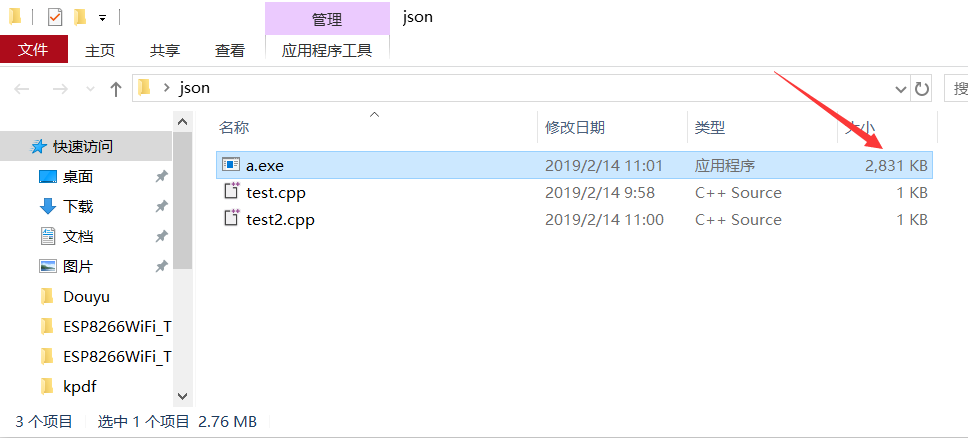
这生成的可执行程序体积有点大啊!
简单应用的话无外乎就是
读取字符串里面的JSON然后生成JSON对象
取任意的 名称/值
将JSON对象转化为字符串形式导出
其中导入/导出最为关键
从 char[] String 或者 file中读取文本返回JSON “对象”
static basic_json nlohmann::basic_json::parse ( detail::input_adapter && i,
const parser_callback_t cb = nullptr,
const bool allow_exceptions = true
) Parameters
| [in] | i | input to read from |
| [in] | cb | a parser callback function of type parser_callback_t which is used to control the deserialization by filtering unwanted values (optional) |
| [in] | allow_exceptions | whether to throw exceptions in case of a parse error (optional, true by default) |
从字符数组中读取
#include <iostream>
#include <iomanip>
#include <nlohmann/json.hpp>
using json = nlohmann::json;
int main()
{
// a JSON text
char text[] = R"(
{
"Image": {
"Width": 800,
"Height": 600,
"Title": "View from 15th Floor",
"Thumbnail": {
"Url": "http://www.example.com/image/481989943",
"Height": 125,
"Width": 100
},
"Animated" : false,
"IDs": [116, 943, 234, 38793]
}
}
)";
// parse and serialize JSON
json j_complete = json::parse(text);
std::cout << std::setw(4) << j_complete << "\n\n";
}
从String 对象中读取
#include <iostream>
#include <iomanip>
#include <nlohmann/json.hpp>
#include <string>
using json = nlohmann::json;
int main()
{
// a JSON text
std::string text = R"(
{
"Image": {
"Width": 800,
"Height": 600,
"Title": "View from 15th Floor",
"Thumbnail": {
"Url": "http://www.example.com/image/481989943",
"Height": 125,
"Width": 100
},
"Animated" : false,
"IDs": [116, 943, 234, 38793]
}
}
)";
// parse and serialize JSON
json j_complete = json::parse(text);
std::cout << std::setw(4) << j_complete << "\n\n";
std::cout << std::setw(4) << j_complete["Image"]["IDs"] << "\n";
}
将JSON对象导出为字符串
string_t nlohmann::basic_json::dump ( const int indent = -1,
const char indent_char = ' ',
const bool ensure_ascii = false,
const error_handler_t error_handler = error_handler_t::strict
}Parameters
| [in] | indent | If indent is nonnegative, then array elements and object members will be pretty-printed with that indent level. An indent level of 0 will only insert newlines. -1(the default) selects the most compact representation. |
| [in] | indent_char | The character to use for indentation if indent is greater than 0. The default is (space). |
| [in] | ensure_ascii | If ensure_ascii is true, all non-ASCII characters in the output are escaped with \uXXXX sequences, and the result consists of ASCII characters only. |
| [in] | error_handler | how to react on decoding errors; there are three possible values: strict (throws and exception in case a decoding error occurs; default), replace (replace invalid UTF-8 sequences with U+FFFD), and ignore (ignore invalid UTF-8 sequences during serialization). |
#include <iostream>
#include <nlohmann/json.hpp>
using json = nlohmann::json;
int main()
{
// create JSON values
json j_object = {{"one", 1}, {"two", 2}};
json j_array = {1, 2, 4, 8, 16};
json j_string = "Hellö 😀!";
// call dump()
std::cout << "objects:" << '\n'
<< j_object.dump() << "\n\n"
<< j_object.dump(-1) << "\n\n"
<< j_object.dump(0) << "\n\n"
<< j_object.dump(4) << "\n\n"
<< j_object.dump(1, '\t') << "\n\n";
std::cout << "arrays:" << '\n'
<< j_array.dump() << "\n\n"
<< j_array.dump(-1) << "\n\n"
<< j_array.dump(0) << "\n\n"
<< j_array.dump(4) << "\n\n"
<< j_array.dump(1, '\t') << "\n\n";
std::cout << "strings:" << '\n'
<< j_string.dump() << '\n'
<< j_string.dump(-1, ' ', true) << '\n';
// create JSON value with invalid UTF-8 byte sequence
json j_invalid = "ä\xA9ü";
try
{
std::cout << j_invalid.dump() << std::endl;
}
catch (json::type_error& e)
{
std::cout << e.what() << std::endl;
}
std::cout << "string with replaced invalid characters: "
<< j_invalid.dump(-1, ' ', false, json::error_handler_t::replace)
<< "\nstring with ignored invalid characters: "
<< j_invalid.dump(-1, ' ', false, json::error_handler_t::ignore)
<< '\n';
}